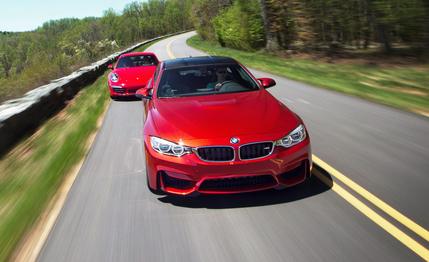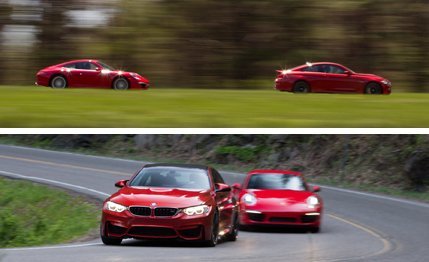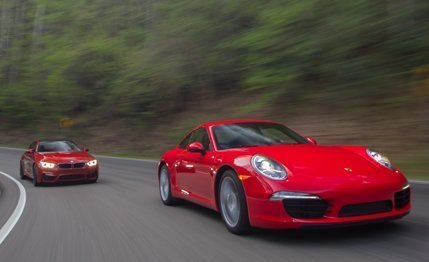 Comparison Tests
Comparison Tests
If there were a perfect way to construct a car, we would have figured it out by now. In 129 years of automotive development, though, the only consensus in the industry seems to be that four wheels are better than three. The perpetual evolution of the automobile, along with a few steadfast traditions, suggests that a great car is more a matter of practical application than scientific theory.
Few vehicle pairings make this notion more obvious than the Porsche 911 Carrera and the BMW M4, two icons that couldn’t be more different, mechanically speaking. What’s the right way to build a car? Engine ahead of or behind the driver? Naturally aspirated or turbocharged? Interactive three-pedal transmission or a heroically quick automatic? These two cars propose an alternate answer: D) All of the above.

Each car is a reflection of its maker’s Weltanschauung, its worldview. BMW’s hot-rod coupe is the product of a full-line manufacturer adept at turning mainstream cars into performance specials. The 911 has been honed over the past 50 years by sports-car experts who only recently discovered sedans and SUVs. BMW and Porsche have more common ground with the X5 and Cayenne than with the M4 and the 911. Yet matchups like this 28-year rivalry are at the core of our Weltanschauung. What passes for one, anyway.
Price brings them closer together than ever. This particular 911 is refreshingly free of frippery. At $92,140, this manual-transmission, base Carrera sports just $6890 in options, every one of them worthy of a piece of your paycheck. The only excess is the sport exhaust, which pleads a convincing case every time you lean on the gas pedal. The long list of equipment that wasn’t on our test car is a mixed bag of fluff and desirable performance equipment—stuff like a limited-slip differential and adaptive dampers, but also a paint-matched key and leather-covered air vents.

BMW’s new (and, technically, first) M4 starts $20,125 lower than the base 911. We closed that gap with a handful of expensive options such as the $8150 carbon-ceramic brakes, $1200 19-inch wheels, and $2900 dual-clutch automatic transmission. Our test car’s final price of $80,325 is nearly double that of the most basic 4-series, for what is almost certainly more than double the car.
So we have a purpose-built sports car versus a factory speed-shop conversion. Who makes the best all-around, all-day-every-day performance car?